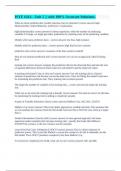Examen
ISYE 6414 - Unit 5 || with 100% Accurate Solutions.
- Grado
- Institución
What are three problems that variable selection tries to minimize? correct answers high dimensionality, multicollinearity, prediction vs explanatory high dimensionality correct answers In linear regression, when the number of predicting variables P is large, we might get better predictions by om...
[Mostrar más]



